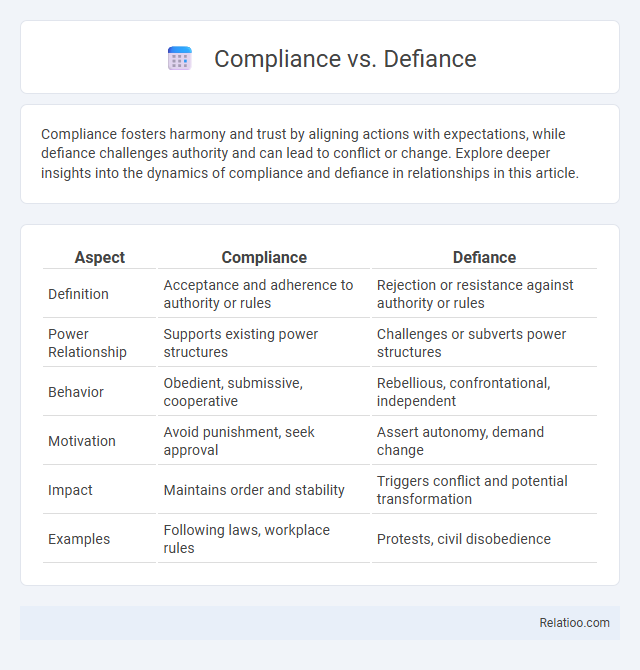Compliance fosters harmony and trust by aligning actions with expectations, while defiance challenges authority and can lead to conflict or change. Explore deeper insights into the dynamics of compliance and defiance in relationships in this article.
Table of Comparison
| Aspect | Compliance | Defiance |
|---|---|---|
| Definition | Acceptance and adherence to authority or rules | Rejection or resistance against authority or rules |
| Power Relationship | Supports existing power structures | Challenges or subverts power structures |
| Behavior | Obedient, submissive, cooperative | Rebellious, confrontational, independent |
| Motivation | Avoid punishment, seek approval | Assert autonomy, demand change |
| Impact | Maintains order and stability | Triggers conflict and potential transformation |
| Examples | Following laws, workplace rules | Protests, civil disobedience |
Understanding Compliance and Defiance
Understanding compliance involves recognizing how individuals adjust their behavior to align with rules, requests, or social norms, often motivated by a desire to avoid conflict or gain approval. Defiance, in contrast, occurs when a person consciously resists or rejects authority or norms, reflecting autonomy or disagreement. Your awareness of these dynamics enhances interactions by identifying when adherence is genuine compliance or when resistance signals deeper issues.
The Psychology Behind Compliance
The psychology behind compliance involves understanding how social influence, authority, and situational factors shape an individual's behavior to align with requests or rules, often without public resistance. Compliance occurs due to internal motivations such as desire for social acceptance, fear of punishment, or perceived legitimacy of authority figures. Your ability to recognize these psychological triggers can help you navigate and manage compliance in various social or professional settings effectively.
Roots and Motivations of Defiance
Defiance often stems from a deeply rooted desire for autonomy and resistance against perceived control or unfair authority, contrasting with compliance's motivation to align with rules and deference's emphasis on respect or submission. The roots of defiance trace back to psychological needs for self-expression, identity affirmation, and the assertion of personal values when faced with external constraints. Understanding your motivations for defiance reveals a complex interplay between individual empowerment and social dynamics driving behavior in challenging situations.
Compliance in Organizational Settings
Compliance in organizational settings involves employees adhering to company policies, regulations, and standards to ensure operational efficiency and legal conformity. It often requires following established protocols and directives to maintain order, reduce risks, and promote ethical behavior within the workplace. Effective compliance strategies include clear communication, training programs, and systematic monitoring to reinforce organizational expectations and avoid regulatory penalties.
Defiance as a Catalyst for Change
Defiance acts as a powerful catalyst for change by challenging existing norms and prompting critical evaluation of institutional rules. While compliance ensures order and deference maintains respect for authority, defiance disrupts the status quo, driving innovation and social progress. Your willingness to embrace defiance can ignite transformative movements that reshape societies and inspire collective growth.
Social Influences on Compliance and Defiance
Social influences on compliance and defiance shape your behavior by leveraging peer pressure, authority, and group norms to align actions with social expectations. Compliance often arises from the desire for acceptance and fear of social sanctions, while defiance emerges when individuals resist perceived unjust demands or challenge authority to assert autonomy. Understanding these dynamics helps reveal how social context drives conformity or rebellion in various settings.
Risks and Consequences of Noncompliance
Noncompliance with regulations or directives exposes organizations and individuals to significant risks, including legal penalties, financial losses, and damage to reputation. Defiance against established rules can escalate conflicts, undermine authority, and result in stricter enforcement actions or sanctions. Your failure to comply may also erode trust with stakeholders and limit future opportunities for collaboration or growth.
When Defiance Becomes Necessary
Defiance becomes necessary when rigid compliance undermines ethical standards or personal integrity, prompting individuals to challenge unjust authority. In contexts where deference to power perpetuates harm or injustice, strategic defiance serves as a crucial form of resistance and social change. Understanding the balance between compliance, defiance, and deference is essential for navigating moral dilemmas and fostering transformative action.
Balancing Compliance with Ethical Judgment
Balancing compliance with ethical judgment requires carefully assessing regulations against moral principles to ensure your actions uphold both legal standards and personal integrity. Navigating between compliance, defiance, and deference involves recognizing when strict adherence may conflict with ethical responsibilities. Developing a nuanced approach allows you to respect authority while critically evaluating mandates to maintain ethical accountability.
Cultivating Healthy Compliance Cultures
Cultivating healthy compliance cultures requires balancing compliance, defiance, and deference to promote ethical behavior and accountability within organizations. Emphasizing transparent communication, employee engagement, and consistent enforcement of policies encourages voluntary compliance rather than forced adherence or passive deference. Integrating training programs that address the nuances of defiance can transform dissent into constructive feedback, strengthening organizational integrity and resilience.

Infographic: Compliance vs Defiance
 relatioo.com
relatioo.com